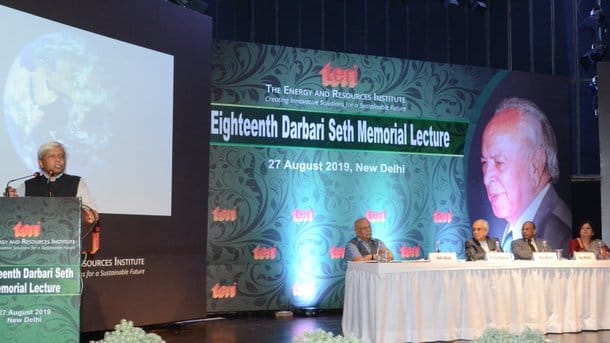New Delhi: When it comes to securing our future, the key aspect is strengthening the foundations of science, feels K. VijayRaghavan, Principal Scientific Adviser to the Union government.
“Curiosity, audacity and the ability to come up with questioning allow us to build a stream of knowledge when there is a crisis,” VijayRaghavan said Tuesday while delivering the 18th Darbari Seth Memorial Lecture — an annual lecture series initiated by The Energy and Resources Institute (TERI) in 2002 in memory of its founder and noted technocrat-industrialist, Darbari Seth.
Speaking on ‘Science and Technology in the Anthropocene’, he said from being just animals trying to survive, humans have become stewards of this planet.
“A disaster 65 million years ago — a large asteroid striking the Earth — wiped off large animals like dinosaurs from the planet. Other animals like us, who were literally in the feet of these large animals, had a chance to explore their manifestations on Earth and dominate the Earth,” VijayRaghavan said.
The period from when humans began to explore Earth to the present day is what geologists describe as the Anthropocene, in which instead of being shaped by the planet, humans are driving changes in nature, he said.
In such a scenario, it is important to democratise our scientific knowledge even if we are not always aware of what use it may have, VijayRaghavan advised.
“Investing in education without knowledge of its use is a critical thing we need to do to secure our future,” he added.
Also read: Why no experiment can explain the supernatural, making it an intellectual dead end
‘From planet of the apes to planet of the apps’
VijayRaghavan said all living things on Earth share a common chemistry “connected through the thread of DNA”.
“We can understand all life on this Earth by studying any example we want. We can understand how bacteria functions by studying the chemistry of an elephant, and we can understand cancer by studying yeast cells,” he said.
Responding to a question from the audience on how to improve education, VijayRaghavan said we have moved from being planet of the apes to the “planet of the apps”.
“This means we have the ability to educate on our fingertips, and this power should be accessible to every citizen of the world,” he said.
Rajiv Kumar, vice-chairman of NITI Aayog who was also present at the event, said the fact that India spends less than 0.7 per cent of its GDP on research and development is something that needs to be “looked into”.
He said the NITI Aayog is working on a vision document for 2047 that will focus more on innovation efforts.
Also read: ‘Hydrogen economy’ can help build radical tech that combats greenhouse gases






